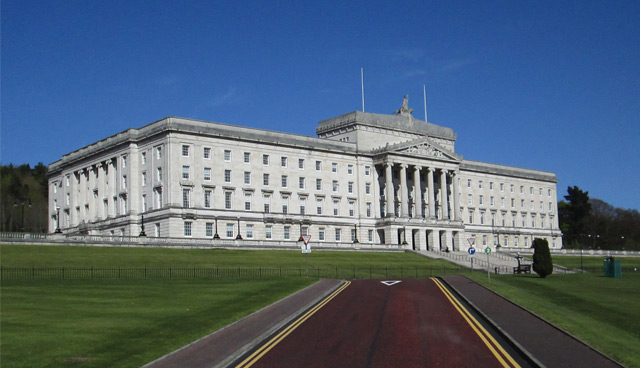Executive legislative programme

The First Minister and deputy first Minister have set out the Executive’s legislative programme for the remainder of the 2019–20 session.
The new legislative programme is far from ambitious and largely seeks to fulfil the commitments ushered in under the New Decade, New Approach (NDNA) agreement, namely the introduction of a series of draft Bills to the Assembly within three months of the restoration of the Assembly.
Legislating is a primary function of the Assembly and legislation is a shared responsibility between the Executive and the Assembly. In the past, criticism has been raised about the ability to legislate in Northern Ireland, mainly aimed at the volume of bills introduced to the Assembly and the corresponding number of Acts that become law.
The new legislative programme has outlined ambitions to introduce 11 bills during the remainder of this 2019-20 session, with the Executive stating that it has focused on legislative proposals that it believes can be introduced as Bills before the summer recess, and that, “with some degree of certainty, can consequently complete their passage before the Assembly is dissolved in 2022”.
In the Assembly’s last full mandate between 2011 to 2016, 60 Executive Bills became Acts and seven non-Executive bills became acts. In March, deputy First Minister Michelle O’Neill presented the Legislative programme to the Assembly for debate and suggested that what was being processed “is in no way an exhaustive programme”.
“We are aware that ministers wish to bring forward additional legislative proposals, which will be admitted to the programme when they have reached a state of the readiness and have obtained Executive agreement,” she added.
The Legislative programme consists of the following Bills.
Communities: Welfare Mitigation/ Social Sector Size Criteria Bill
The Bill will remove the current end date of 31 March 2020 for mitigation payments for the Social Sector Size Criteria (Bedroom Tax), fulfilling the commitment in New Decade, New Approach that existing mitigation payments should continue beyond 31 March.
Communities: The Pension Schemes Bill
Aimed at ensuring that those saving into a Master Trust scheme, which is a form of multi‐employer occupational pension scheme, are protected. The Bill will introduce an authorisation and supervision regime for Master Trusts and provide the Pensions Regulator with greater powers to take action where key criteria are not met. The Bill will also remove barriers to capping excessive exit charges on savers accessing their pensions flexibly and a ban on member-borne commission charges.
Communities: Housing (Amendment) Bill
The Bill will make the changes required to address the Office for National Statistics’ classification of Housing Associations to the public sector. Without such reclassification, all Housing Association borrowing would be charged against Executive Funds and Financial Transaction Capital would not be available.
Licensing and Registration of Clubs (Amendment) Bill
The purpose of the Bill is to tackle practices within the licensed trade which could contribute to alcohol misuse. Originally introduced in the previous mandate, the Bill fell on the dissolution of the Assembly in 2017. It is also intended to support the hospitality sector in promoting tourism, by making its offering more sustainable and attractive. It will also recognise the role licensed premises and private registered clubs play in their local communities as places to socialise and providers of employment.
Provisions within the bill include:
- restrictions on the advertising of alcoholic drinks in supermarkets and off sales premises;
- introduction of occasional additional late opening for certain licensed premises and changes to holiday period opening hours for certain licensed premises and registered clubs;
- provision for a Special Events Licence for events;
- introduction of a new category of licence for local producers of alcoholic drinks; and
- introduce changes to the law affecting private members clubs.
Finance: Budget Bills
Finance Minister Conor Murphy has already introduced the first of the two Budget Bills, an essential part of the annual financial cycle. The current Budget Bill will be for one year but it is hoped that future Bill will cover a three-year period.
Justice: Criminal Justice Bill
The Criminal Justice Bill to reform the committal process, a key priority of the NDNA agreement. The reform is part of a broader ambition to speed up the current criminal justice process for victims, witnesses and the accused. The Bill is designed to address the recommendation of the Fresh Start Panel by abolishing oral evidence at the ‘traditional committal hearing’ stage, and provide clarity about the operational outworking of direct committal.
Justice: Domestic Abuse Bill
The Domestic Abuse Bill will create a new domestic abuse offence, closing a gap in the law to ensure that protection is not limited to cases of physically violent behaviour, as at present. The new offence will apply where there are two or more occasions of abusive behaviour against a partner, former partner or close family member. It will cover behaviour that is abusive because it is controlling or coercive or amounts to psychological, emotional or financial abuse of the other person, and can also include behaviour that is physically violent, threatening or intimidating.
Executive Office: Northern Ireland Act 1998 Amendment No 1, 2 and 3 Bills
The First Minister and deputy First Minister are set to introduce a three piece legislative package which will respectively make provision for an Office of Identity and Cultural Expression and repeal the Administration of Justice (Language) Act 1737; appoint an Irish Language Commissioner and to provide official recognition of the status of the Irish language; make provision to appoint a Commissioner to enhance and develop the language, arts and literature associated with the Ulster Scots and Ulster British tradition in Northern Ireland; and make provision for a duty on the Department of Education as regards Ulster Scots.
While the First and deputy First Minister have signalled their hope that legislation will be able to be brought forward to the Assembly before the summer recess, no timings have been associated with the individual Bills. Early concerns centre on the ability of departments to formulate policy in such a tight timeframe. Given that Departments had operated without an Assembly for over three years, without developing policy, there is now a need for ministers to, as Michelle O’Neill described it, “reinvigorate the policy development process”.
Another obvious challenge is that institutions are, unlike previous years, halfway through a mandate. O’Neill sees both advantages and disadvantages in this case. “The two years remaining to us obviously place a constraint on the number of Bills that will be able to complete their passage before the end of the mandate. As the mandate progresses, this factor and the risk of nugatory activity will be important considerations,” she told the Assembly.
“At the same time, those constraints will place a discipline on all partners in the legislative process — Departments, Ministers, the Assembly and its Committees — to progress legislation efficiently and accord the progress of Bills due priority.”
Chair of the Committee for Communities Paula Bradley also raised concerns regarding the timetable. Welcoming the initial legislative proposal, she said: “…we have only two years left in this mandate, and the Executive need to exercise caution in their legislative priorities. In doing so, they need to consider the capacity of the Assembly and its Committees to process the legislation.
“Loading Committees with two or even three Bills at the same time is not good practice. It will not lead to good scrutiny and could lead to bad legislation. I, therefore, urge Ministers to consult with their respective Committees on the logistics underpinning the timetabling of legislation.”
Noticeably, some of the priorities from the NDNA agreement were omitted from the legislative programme, namely around childcare, a potential climate change Bill and a Bill to establish an independent environment agency.
Responding to some of these omissions highlighted by MLAs, First Minister Arlene Foster said: “The publication of the legislative programme is only the beginning of a process which will, over the next two years, involve Ministers, the Executive, the Assembly and its Committees working closely and collaboratively to deliver the legislation.
“That, of course, is not an end in itself. What is most important is the positive difference that it will make to the lives of our citizens. We fully expect this programme to grow as the work of the Departments regains momentum, and we will keep the Assembly updated on that, but we must also be conscious of the limited time frame within which we are working.
“We believe, therefore, that our approach to legislation should be governed by a number of important considerations as we move forward. First, will it make a positive difference to people’s lives by offering protection or remedying weakness in provision? Secondly, is it essential to be done now? Would it displace other more critical legislation? Thirdly, is it achievable? Is it based on sound policy and implementation plans? Lastly, can it be scheduled to be completed within the time available in order to avoid nugatory effort at the end of the mandate, bringing about congestion, which has, unfortunately, been a feature of past mandates?
“Taking those considerations into account and with a mutual recognition of the importance of legislation, we believe that there is great potential for the Executive and the Assembly to work together to maximise the value that we can obtain from the next two years and to lay a firm foundation for legislation in the next full mandate.”





